How to make Dehydrated Hash Brown Potatoes so you can store 8 pounds of potatoes in three jars. This food dehydrator recipe is going to help you save potatoes for months if not a year.
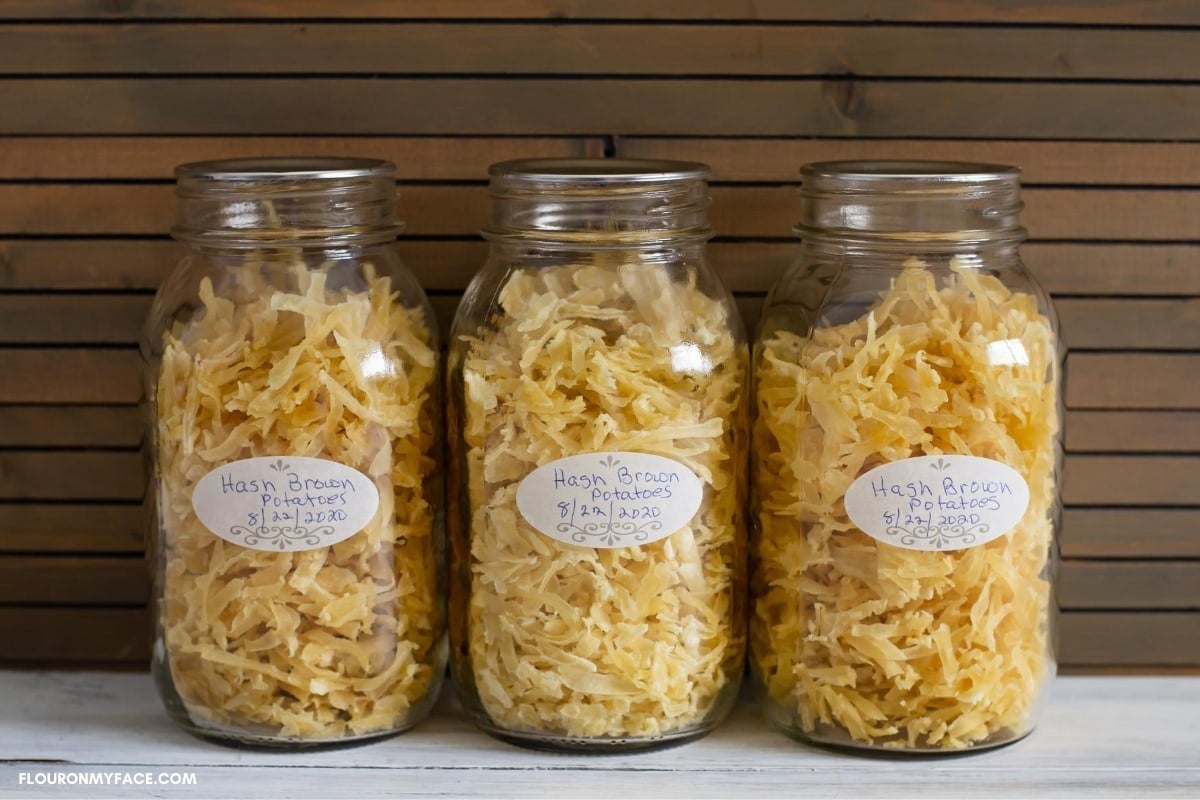
Dehydrating is an easy preserving method that will extend the shelf life of fresh potatoes for years.
You can store 8 pounds of fresh potatoes in 3 jars!
How can that be? Dehydrated food shrinks 50% or more as it dries allowing you to store a huge amount in just 3 quart jars.
I recently made dehydrated diced onions. I dried about 8 pounds of diced onions and it fit in one quart size jar. Amazing, isn't it?
If you need a long term food storage option for fresh potatoes dried hash brown potatoes is the way to go.
Dehydrated shredded potatoes are perfect for making hash browns, breakfast recipes and potato casseroles.
If you go camping dehydrated hash browns are a perfect camping food.
Dehydrating is a great way to preserve all your favorite fruits and vegetables.
You can all your favorite soup ingredients like dehydrated butternut squash, dehydrated frozen vegetables, dehydrated bells peppers, and dehydrated mushrooms and have them on hand all year long!
3 ways to preserve fresh potatoes
- You can shred slightly cooked potatoes to make dehydrated hash brown potatoes.
- Or cut and blanch thinly sliced raw potatoes and dry to make dehydrated scalloped potatoes.
- Or cut cooked or blanched potato cubes and dehydrate to add to soups or stews.
- Guess what? You can even dehydrate frozen store bought cubed or shredded potatoes if you want.
Once the dehydrated potatoes are rehydrated they can be cooked exactly like fresh potatoes.
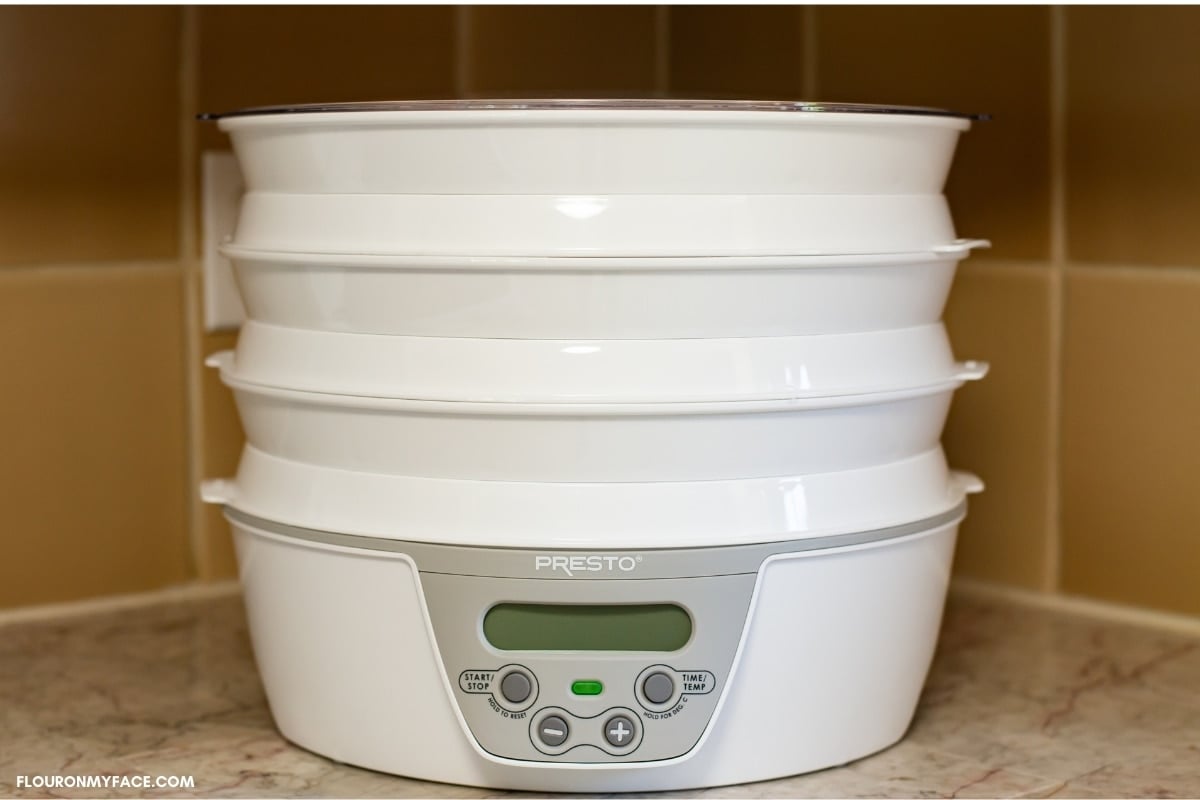
Equipment Needed
- vegetable peeler or sharp knife: to peel the potatoes
- large bowl or pot: to rinse and soak the peeled potatoes to prevent browning
- large cookie sheet: I shredded the potatoes on a large cookie sheet. It made picking up and loading the trays very easy without crushing the potato pieces.
- box grater: a box grater shreds the potatoes perfectly. You could use a food processor instead.
- Food dehydrator: I use the Presto 06301 Dehydro Digital Electric Food Dehydrator with thermostat and timer.
- Nonstick mesh tray liners: mesh liners are necessary to keep the shredded potato pieces from falling through the dehydrator tray as they shrink.
- Work Surface: I used a large cookie sheet but you can use a wooden cutting board or plastic cutting mats.
- Storage containers: You will need an airtight container to properly store the dehydrated potatoes. Wide mouth mason jars are easier to fill but you can use regular mouth quart jars if you don't have them.
- Wide mouth funnel: Filling wide mouth or regular mouth quart jars are easy when you use a wide mouth funnel.
- Vacuum sealing system: optional but well worth it when dehydrating food for long time storage.
My Favorite Dehydrating Tools
Using the right tools for the recipe is just as important as the ingredients you use.
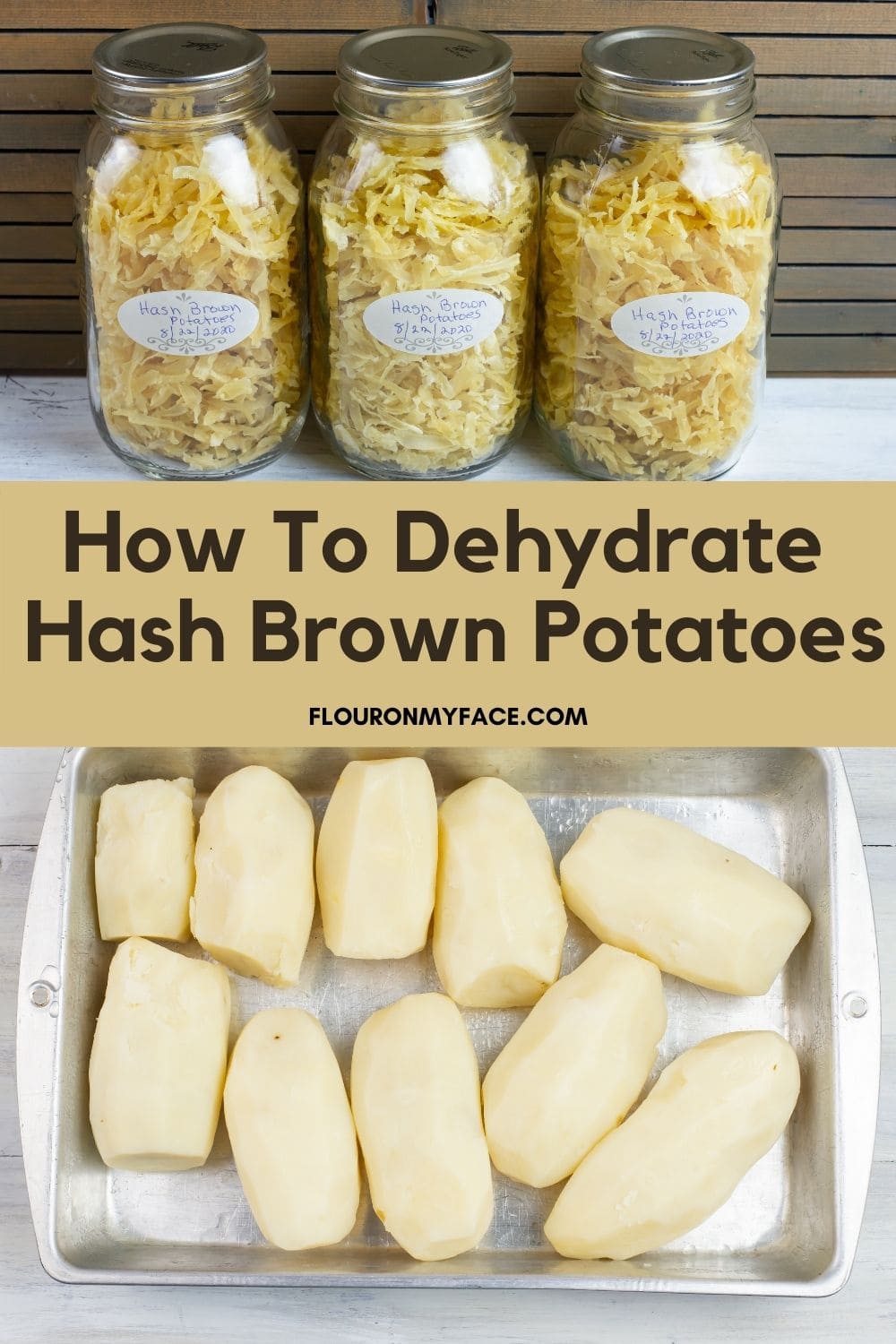
FAQ
I used large russet potatoes but you can use any of your favorite large potatoes.
It takes about 6 to 8 hours at 125 F. degrees to dehydrate hash brown potatoes. Times will vary depending on the type of potato used, the dehydrator used and even the temperature of the area in your home where your dehydrator is.
Dehydrated potato slices can be used to make scalloped potatoes, potato salad, potatoes casseroles or any other recipe that calls for fresh potatoes. Dehydrated shredded potatoes can be used to make hash browns.
The shelf life of dehydrated potatoes will depend on how well they are stored. Vacuum sealed jars or bags of dehydrated potatoes will have the longest shelf life. Vacuum sealing can extend the shelf life of dehydrated potatoes to 10 or more years. While storing the dehydrated potatoes in a zipper topped bag will have the shortest shelf life of just a few months.
Rehydrating dehydrated potatoes is as easy as soaking the dried pieces of potato in a bowl of water. If adding dried cubed or sliced potatoes to a soup or stew you can skip the soaking and add them directly to a pot of soup or stew 30 minutes before the recipe is done.
Recipe Prep
- Peel the potatoes and place them in a large container and fill with cold water. Keep the peeled potatoes covered with cold water. As you peel each potato put it in the container of water to keep them from browning.
- Pressure cook or boil the peeled potatoes in a large pot until just fork tender.
Cooking the Potatoes
For more info on cooking potatoes in the Instant Pot check out my Instant Pot Red Potatoes post. Otherwise, follow the directions below.
I pre-cooked the potatoes using my electric pressure cooker before dehydrating the shredded hash brown potatoes. When dehydrating cooked potatoes you do not need to blanch the potatoes before drying.
- To pressure cook the potatoes place a steam basket or silicone sling inside the pressure cooker insert pot.
- Stack the peeled potatoes in the basket or sling. Pour 1 cup of water into the pot.
- Twist the lid on and set the valve to sealing.
- Pressure cook the potatoes for 8 minutes for large potatoes and 6 minutes for medium potatoes on the steam setting. Allow the pressure to naturally release about 10 minutes.
- Once done open and remove the cooked potatoes. Carefully lift the silicone sling or steamer rack up and plunge the potatoes into a bowl of ice cold water to stop the cooking.
- Cool the potatoes in the water for about 8 minutes. Transfer the potatoes to an aluminum pan or large roasting pan in a single layer, cover and refrigerate until completely cold. I waited until the next day to shred the potatoes.
Dehydrated Sliced or Cubed Potatoes
If dehydrating sliced potatoes for scalloped potatoes or cubed potatoes you will need to blanch the raw potatoes before they can be dried.
Blanching or cooking is necessary to inhibit the natural enzymes that are in all fresh vegetables before dehydrating and to prevent the potatoes from browning during the drying process.
Blanching also helps protect the vitamins and minerals in vegetables when preserving them by this drying method.
Todays post will cover dehydrating shredded cooked potatoes. I will do another post at another time for sliced scalloped potatoes.
Dehydrating Tips
- Cooking the potatoes before dehydrating means no blanching is required for shredded potatoes.
- Do not over cook the potatoes. They will be too soft to shred. Under cooked potatoes are better than over cooked.
- Chill the cooked potatoes completely before shredding or the cooked potato may fall apart when shredding.
- Vacuum sealing the dried potatoes can extend the shelf life many years.
- Make sure the shredded potato pieces are completely dry by squeezing the center or breading a few in half. If the pieces are not hard as a rock and soft in the center they are not dried completely.
Steps to Dehydrate Shredded Potatoes
- Prep the potatoes: Peel and rinse the whole potatoes.
- Cook: Cook the potatoes in a pot of boiling water or in a pressure cooker. Do not over cook the potatoes. You want them cooked but still firm enough to hold their shape and not fall apart. Do not over cook!
- Cool: Immediately rinse the hot potatoes under cold water. Place the warm potatoes in a bowl of cold water for about 15 minutes to bring down the internal temperature and stop the cooking.
- Drain: Drain the potatoes in a colander.
- Chill: Place the potatoes in a single layer in a pan. Cover and refrigerate until completely chilled. The potatoes must be completely cold before shredding.
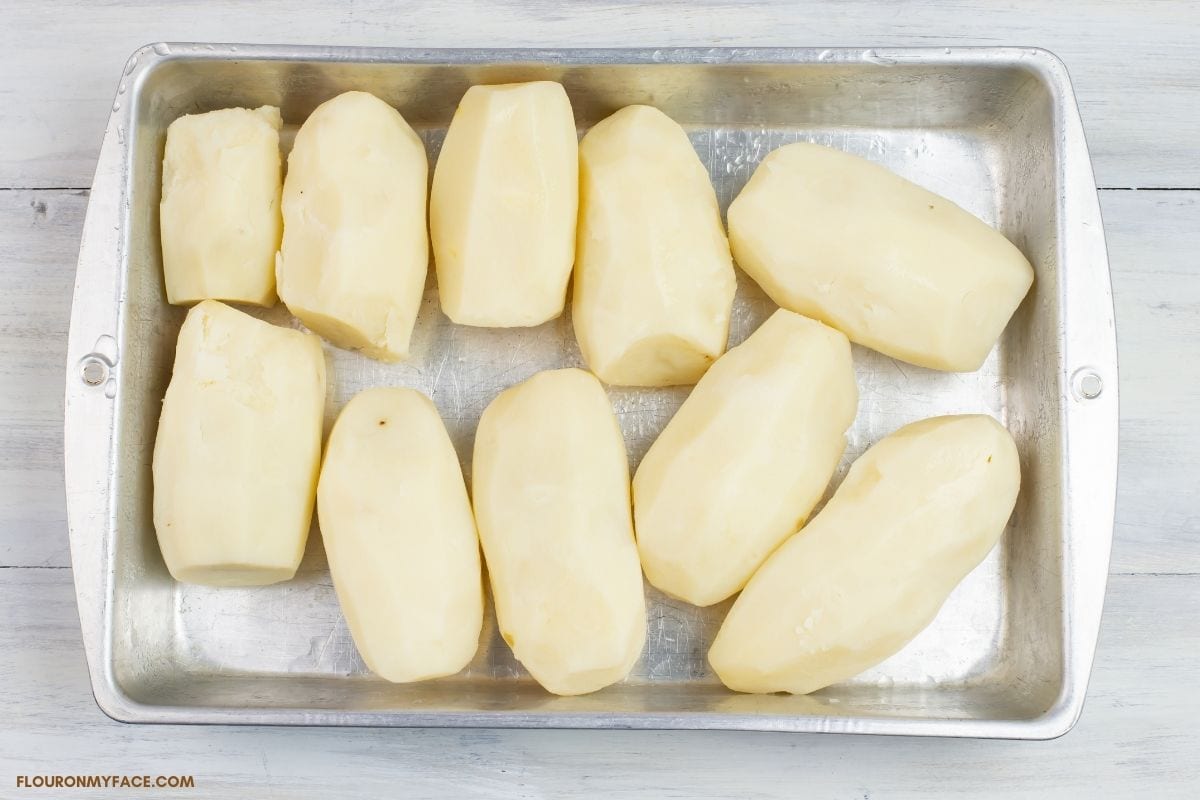
- Shred: Shred the cold potatoes using a grater or food processor.
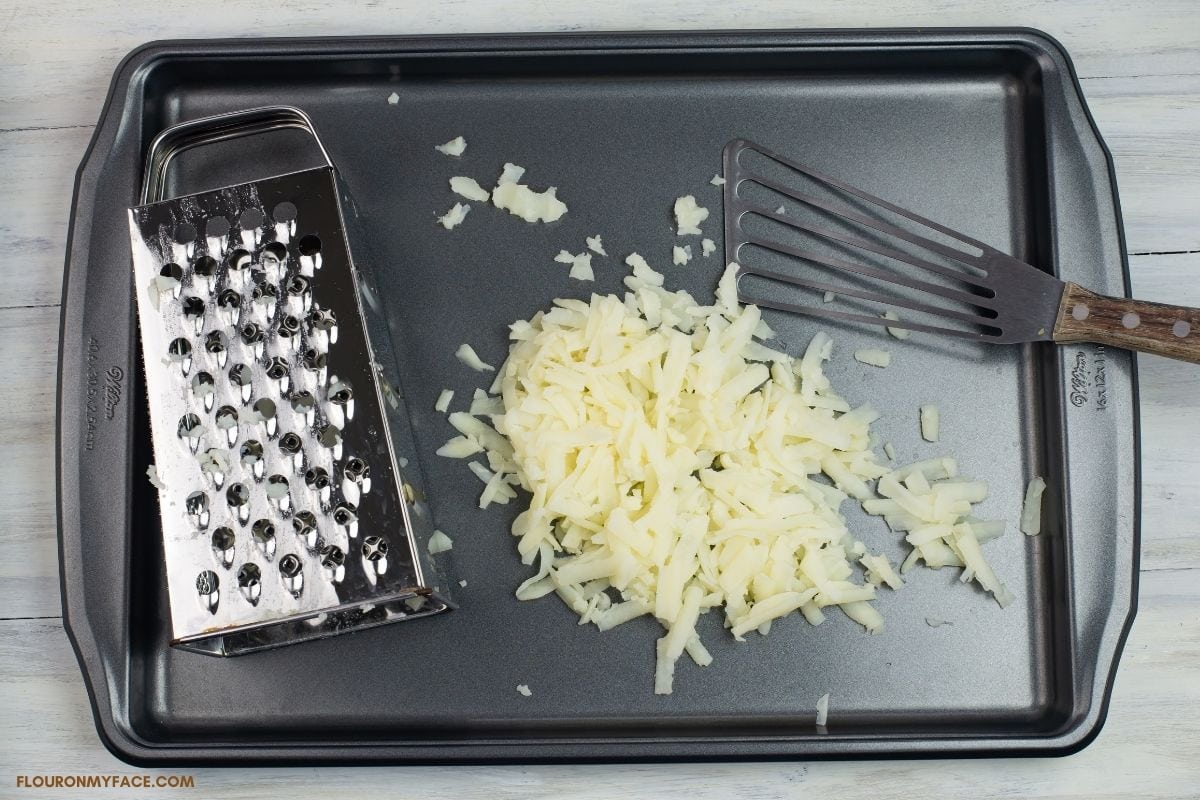
- Filling the trays: Spread the shredded potato pieces over a dehydrator tray until the tray is full. Fill the dehydrator trays until you run out of shredded potatoes or you have reached the number of trays your dehydrator will hold.
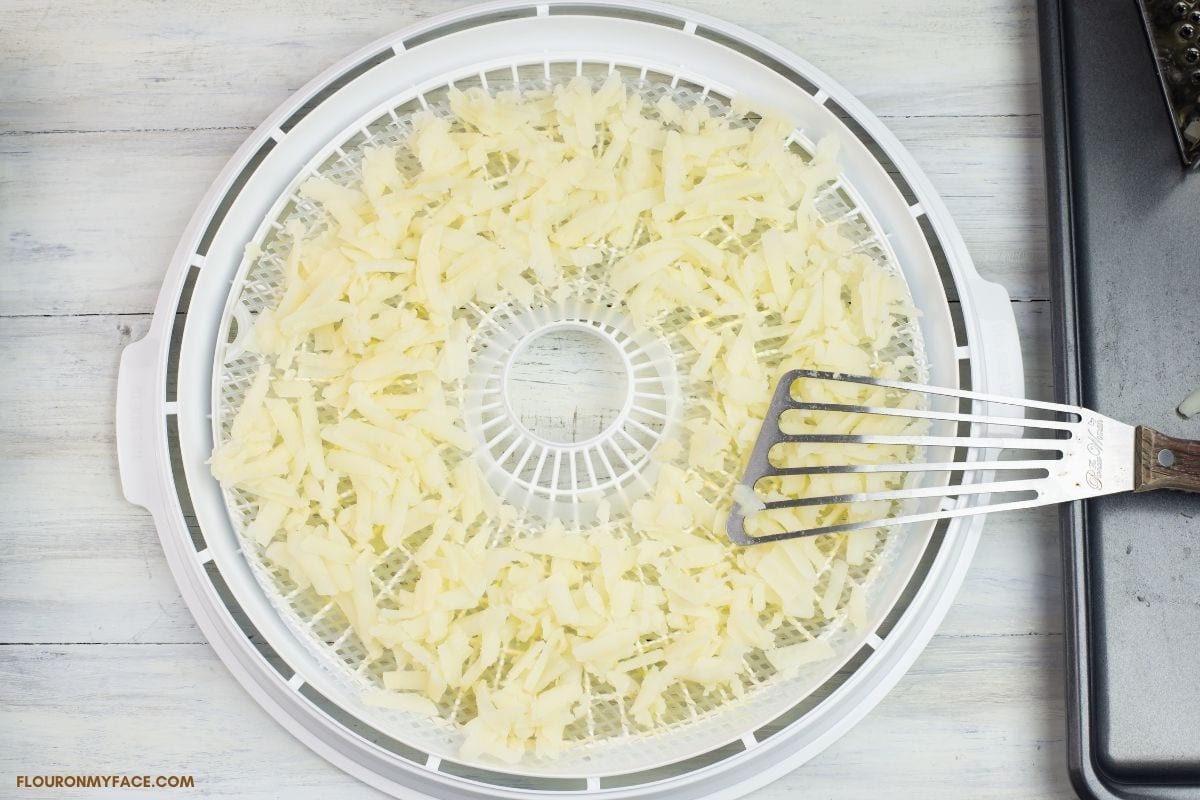
- Dehydrating: Dehydrate the shredded potatoes at 125 F. degrees for 6 to 8 hours. The amount of time it takes to dehydrate shredded hash brown potatoes will vary.
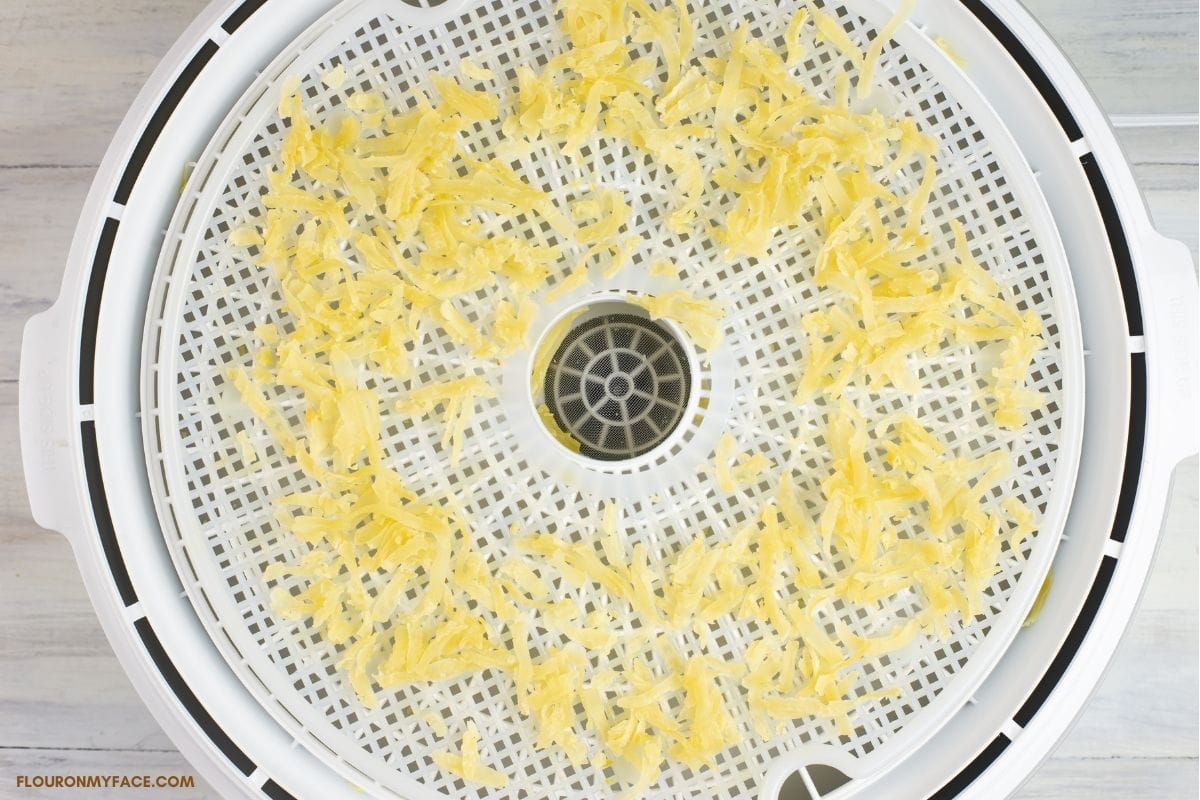
- Cooling: Cool the hot dried potatoes completely before storing.
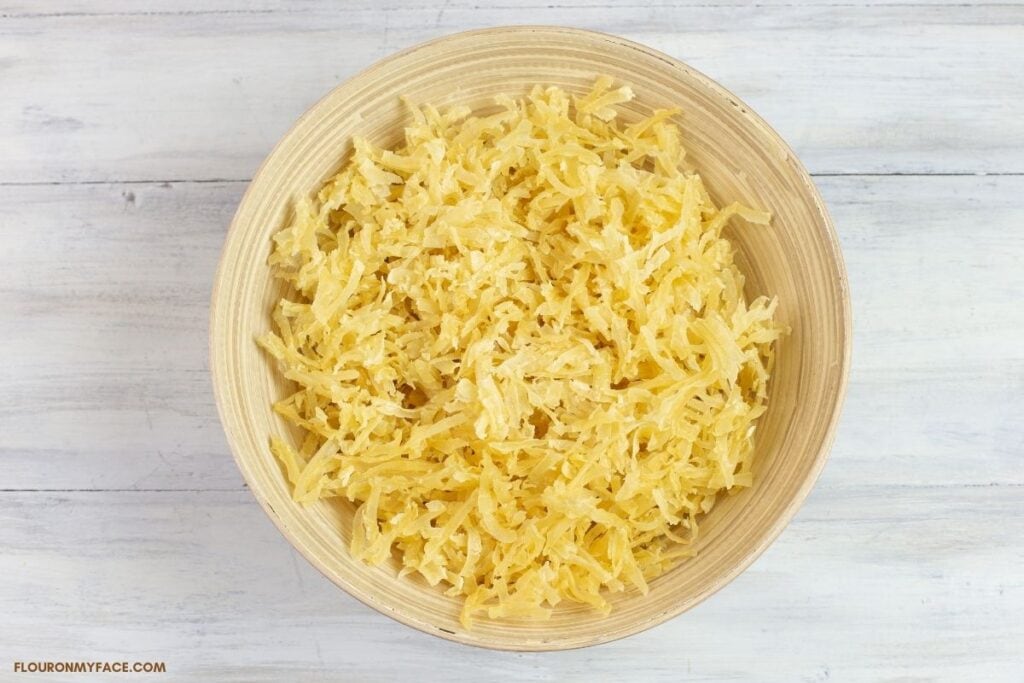
More Dehydrating Recipes
Pack the pantry full with these dehydrating recipes.
Related Posts
Print the recipe

Email questions or recipe requests to flouronmyface@gmail.com. Follow me on Pinterest, YouTube, Instagram and Facebook.
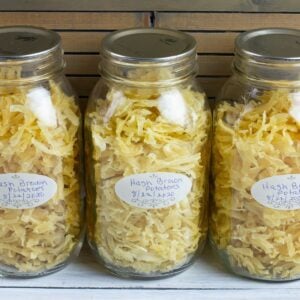
Dehydrated Hash Brown Potatoes
Equipment
- 3 Quart Mason Jar
Ingredients
- 10 large russet potatoes
- 1 water
Instructions
- Wash and peel the potatoes.
- Cook the potatoes until just fork tender. Cook the potatoes in a pot of boiling water or in a pressure cooker. Do not over cook the potatoes. You want them cooked but still firm enough to hold their shape and not fall apart. Do not over cook!
- Immediately rinse the hot potatoes under cold water. Place the warm potatoes in a bowl of cold water for about 15 minutes to bring down the internal temperature and stop the cooking.
- Place the potatoes in a single layer in a pan. Cover and refrigerate until completely chilled. The potatoes must be completely cold before shredding.
- Use a box grater to grate the potatoes.
- Fill the dehydrator trays. Spread the shredded potato pieces over a dehydrator tray until the tray is full. Fill the dehydrator trays until you run out of shredded potatoes or you have reached the number of trays your dehydrator will hold.
- Dehydrate the shredded potatoes at 125 F. degrees for 6 to 8 hours or until they are completely hard.
- Cool the hot dried potatoes completely before storing in air tight containers.
- Store in air tight containers.
Video
Recipe Expert Tips
- Preserving vegetables, like potatoes by drying them is a great way to enjoy fresh vegetables that have been dried. Dried vegetables last much longer than fresh. Once rehydrated the dried potatoes taste just as good as fresh potatoes.
- Cooking the potatoes before dehydrating means no blanching is required for shredded potatoes.
- Do not over cook the potatoes. They will be too soft to shred. Under cooked potatoes are better than over cooked.
- Chill the cooked potatoes completely before shredding or the cooked potato may fall apart when shredding.
- Vacuum sealing the dried potatoes can extend the shelf life many years.
- Make sure the shredded potato pieces are completely dry by squeezing the center or breading a few in half. If the pieces are not hard as a rock and soft in the center they are not dried completely.


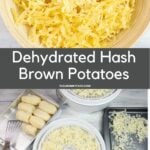







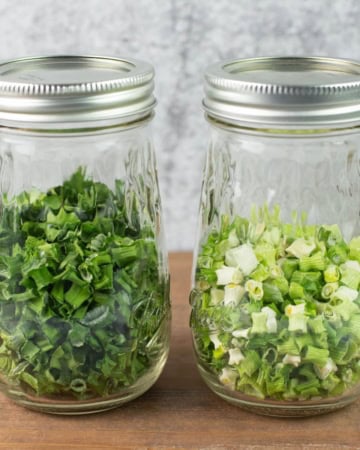
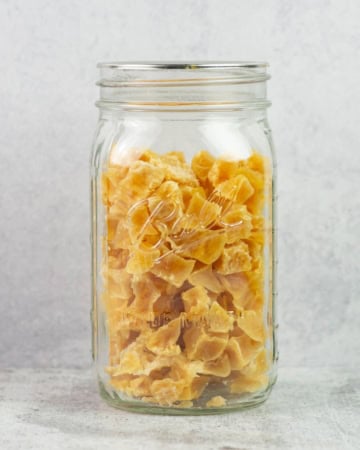
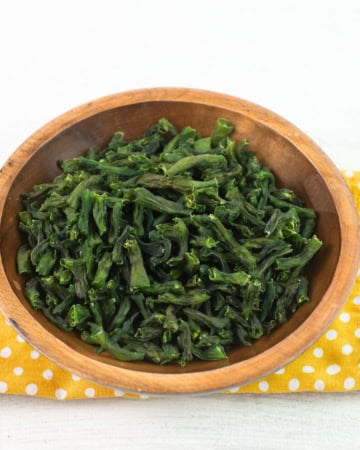
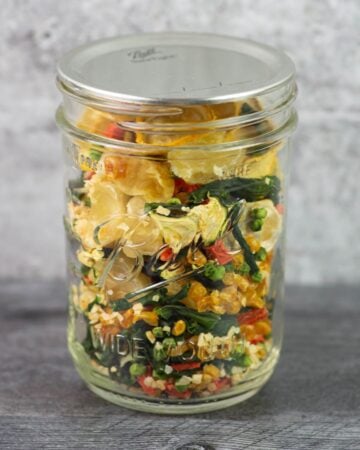
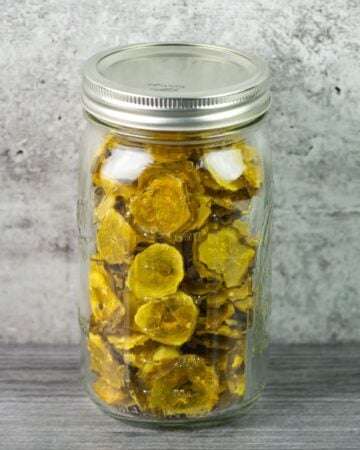
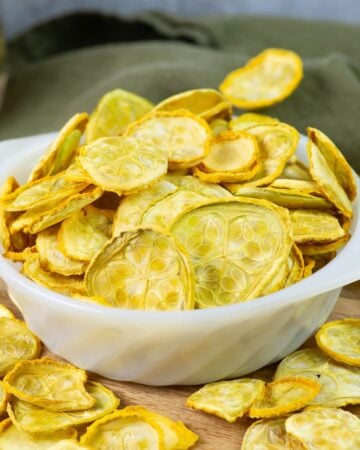
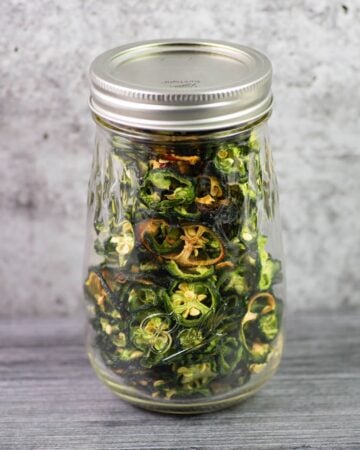
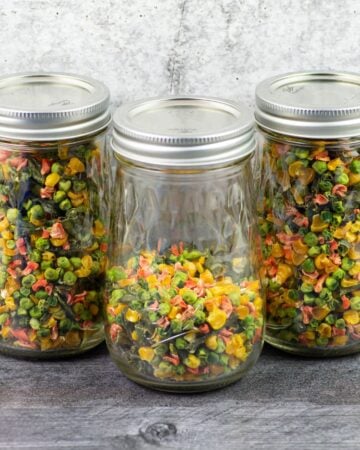
Kim
For long term storage use glass jars or mylar bags with oxygen absorbers. Plastic containers are porous.
Sheri Metschan
When freezing shredded potatoes I par bake them 1st. I was wondering if I could do that when dehydrating. My shreds aren't as pretty as yours but it works. It's my intent that they stay firmer but I usually end up getting them a little too soft. It still works out. I thought I would shred them in my food processor but my shreds ended up being more rice like so I gave up and hand shredded them on my box grater which was just as well because my blemish free potato had a hollow spot that was brown in the middle. So....I sliced the potatoes in half longways and grated potato flesh to the grater, the skin side in the palm of my hand which protected my hand from the grater. Most of the skin didn't get shredded and I picked out any large pieces of skin and spread out on trays and dehydrated at 125. I think it only took about 4 hours to dehydrate. Note-I baked my very large potatoes in my convection toaster oven at 350 for 1 hour. A tad too long. The food processor fail potatoes I dehydrated and will run through my spice grinder and see how they turn out for mashed potatoes. I suspect when I rehydrate my shreds they won't be as crunchy because of the smaller shreds but that's fine with me. I find par baking potatoes eliminates the hassel of blanching and putting in an ice bath and I hate to use all that water for an unnecessary step. I hope this lengthy comment helps someone.
Arlene Mobley
Sherri thanks for sharing this great tip!
Susan
Thanks for this. I just got back from camping. I wanted to take dried hashbrowns, but couldn't find any. I found a site that said just dehydrate frozen ones. Have you seen the prices? Over $5 for a bag and it wasn't a big bag. No I will try this now. I'm going home and boiling potatoes.
Lois Luckovich
Thanks so much for this it made tasty hash browns!
Christie
I would think it would be easier and quicker to shred the potatoes prior to cooking so that you can blanche the shreds for a couple of minutes per batch and then put them right onto the dehydrator trays. Thoughts?
Arlene Mobley
Hi Christine let me know if you try it. I think you will find the small pieces turn to mush and you won't be able to spread them out on the try. Good luck!
SophieBug
That’s how I do it! It’s so much easier!! Boil enough water to submerge the shredded potatoes, boil them for 2-3 minutes (just stir and keep an eye on them so they don’t turn to mush).
Susan
Thanks for the tips. I was wondering if we need to can the potatoes after dehydrating them. You mentioned vacuum sealing then in jars. Is that the same as pressure cooking them? Thanks again
Arlene Mobley
Hi Susan
Vacuum sealing is not the same as canning.
Reinfinity
If you don't have a dehydrator, can you do this in the oven? If so what temp and for how long?
Arlene Mobley
I don't know what temperature since I have never done this in the oven although I am sure it would work. I would set the oven on the lowest temp it will go and keep my eye on it.
Ro
Pls put a wooden spoon to keep the over door ajar while drying to alow steaming out
Traci
Hi Arlene. I believe the temp for dehydrating potato shreds is 135° F., for 6-8 hrs. Fortunately for me, my oven has a fan and has a dehydrating option. As well as convection, air fry, and proofing for bread. Hope this helps
Arlene Mobley
Hi Traci
Thanks for the helpful comment. Most vegetables are usually dehydrated at 135° F. But in the case of potatoes (and some fruits and other vegetables) Excalibur recommends 125° F to prevent case hardening. Which is when the outer layer dries and locks moisture into the center preventing the proper amount of water being removed from the vegetable pieces. Which as I'm sure you know can lead to spoilage. Here is a very helpful article on dehydrating from Penn State University that explains case hardening very well.
Liz
Never knew this was a thing. I've been getting into gardening and food storage the past few years. We have over 100 lbs of potatoes this year and I was in over my head trying to figure out how to store them, but then this randomly popped up on my Pinterest feed after I had searched for a bunch of potato recipes. Pretty stoked to start the process on some of them tonight! Thanks for sharing! If you've got any other potato tips, I'm all ears.... or I guess "eyes". xD! lol
Arlene Mobley
So glad I could help Liz. I wish I could have a garden that big!
Leesa
Could you shred the potatoes and then briefly cook them?
Arlene Mobley
Leesa
I don't think this would work because the potato pieces would turn to mush when you cooked them.
Lisa Sharpe
Did you mean that they should be hard s a rock and not soft in the middle? If you were going to add citric acid to preserve the color, at what stage should you do that?
Arlene Mobley
Lisa the pieces should be hard and not soft in the middle. I would not add any citric acid to preserve the color.
Samantha
How do you rehydrate to use for making hashbrowns?
Arlene Mobley
Just soak them in cold water for until they get soft, drain well and cook as needed.
Marilyn
********************************************************
Thank you for sharing at #OverTheMoon. Pinned and shared. Have a lovely week. I hope to see you at next week’s party too! Please stay safe and healthy. Come party with us at Over The Moon! Catapult your content Over The Moon! @marilyn_lesniak @EclecticRedBarn
********************************************************
Lisa Sharpe
Do you need to add any Fruit Fresh to maintain tge color in storage?
Arlene Mobley
Hi Lisa
I did not pretreat the potatoes. I used russet potatoes and soaked them in cold water as I peeled them. Then they were cooked until fork tender. Because the potatoes are cooked it keeps them from browning.